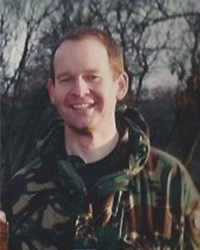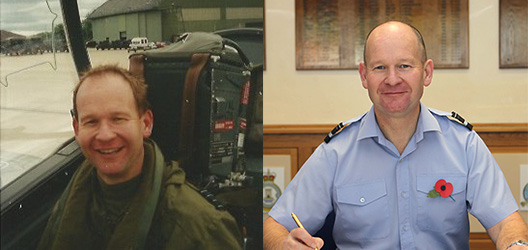26 Jun 2019
University staff member shares their experience to mark Reserves Day
 Graham serving as a wing commander in the RAF in 2000.
Graham serving as a wing commander in the RAF in 2000.
This week, marking both Reserves Day (26 June) and Armed Forces Day (29 June), the University has spoken with a member of staff from the military community about their experience.
In 2016, Loughborough signed the Armed Forces Covenant to demonstrate its support for the military community in various ways, including supporting employees who choose to be members of the Reserve Forces; participating in Armed Forces Day; working closely with the Defence and Rehabilitation Centre, and more.
Graham Howard, Director of Estates and Facilities Management, joined the University in March 2019 after a long career across the military and private sector. He currently serves as a Reservist.
Q: Can you tell us about your experience and how it has influenced you?
As a youngster, my dream was to join the Royal Air Force (RAF) and just before I sat my A levels, they offered me a commission – I joined up three days after my 18th birthday. At that time, the Cold War was at its height, and the RAF was five times the size it is now. After officer and professional logistics training, I specialised in air mobility, explosives and fuels.
Over a 30+ year career, I had around 20 postings to bases in the UK and overseas to Belize and Hong Kong. Fast forward to the end of my regular military career, and I was the senior logistics officer in the UK Armed Forces based in the Ministry of Defence.
In various guises, I was seconded to the Foreign Office to head the Strategic Delivery Unit in the British Embassy in Kabul, commanded the Joint Force Logistics Headquarters in Helmand Province and was ultimately responsible for the logistics plan that recovered British forces and their equipment home in 2014 after more than eight years of combat operations.
My military experience has definitely shaped me – it would be odd if it had not after over 30 years. The military is a very competitive and demanding environment and the selection, training and operating processes have found their way into other sectors, as has much of the language.
Fortunately for me, my logistics and leadership skills were transferable to the private sector, and I was able to transition straight into a role with KPMG as a defence and security consultant. After four years, I saw the opportunity to join Loughborough University. As the parent of a former student, I know it’s a fantastic University with a brilliant reputation and it’s a privilege to be part of the team.
Q: What lessons have you learned?
Many! One of the best pieces of advice I was given was to ‘Enjoy the journey, you might not reach the destination’, and sadly I have known far too many military friends and colleagues that have paid the ultimate sacrifice.
Another would be to try to strike a better life/work balance.
My third is that life in the armed forces is special – the experience and training that you get is unique, and the transferable skills are in demand outside the military.

Q: What does your current role as a Reservist entail?
I spent the last four years of my military career in the Ministry of Defence in London as the Assistant Chief of the Defence Staff responsible for the logistics support to all the UK’s joint military operations around the globe. When the time came to hand over the job, I was a few months short of my official retirement date and the RAF asked if I would lead an investigation – naively, I agreed. That got me into the Service Complaints Appeals process, which is what I now do as a Reservist.
The complaints process provides military personnel with an impartial arms-length grievance route that is overseen by individuals who are independent and who have the authority to resolve issues. The process is overseen by an ombudsman, and I sit as one of three senior retired RAF officers that chair decision panels and appeal bodies.
I do much of the work at weekends, in the evenings and on the odd day when an appeal panel has to sit. Contrary to what many believe, as a body we are independent and have considerable powers. I believe that I have probably upheld approximately 60% of complaints – proof that the system does not always get it right!
Q: What can be done to support those from the military community?
Civilian life can be a daunting prospect for servicemen and women, and for many the only job that they will have had will be in the armed forces. Be aware of the promise made by the nation in the Armed Forces Covenant to help those who serve or have served in the armed forces, to secure accommodation, to start a new career and to study. This includes offering injured servicemen and women and bereaved families extra support where appropriate.
My plea would be to take time to understand the outstanding training, skills and leadership experience they possess and to appreciate that the military community is resilient, dependable and adaptable. Be prepared to help veterans and ensure that Reservists are supported and encouraged to maintain their military commitments. What you lose in time when they are away for a few weeks every year will be more than made up for the commitment and skills that are given back.
For more information on how the University supports those in the Reserve Forces, visit the HR website.















